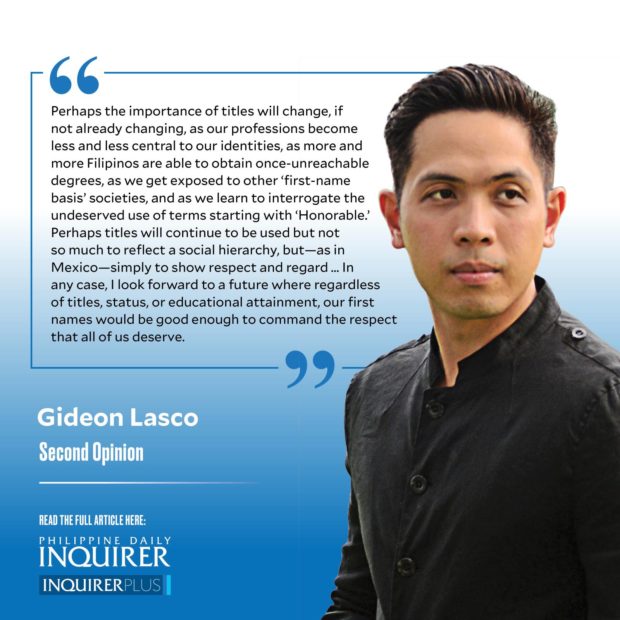The affliction is an obsession with titles, form and optics. You will find a professor introducing himself: My name is professor so-and-so. Or an engineer: I’m engineer so-and-so. But would it not sound odd if we heard Noam Chomsky, who teaches at the Massachusetts Institute of Technology, a premier crucible for life-changing technical and ideatic innovation—and who is arguably the greatest linguist in history—introduce himself as Professor Noam Chomsky? …”
“Here, professors who have never developed any great ideas or theories will be tripping over their own titles because the titles precede them and their work … For people like Chomsky, the title is a ‘by-the-way’ appellation; what is important and what precedes him is the work he has done. Likewise, legislators in other regions of the world let the reputation of their revolutionary and transformative agendas say who they are.”
The above words were made by the Kenyan commentator Tee Ngugi as a critique of his country’s politics and society—but he may well be talking about the Philippines.
What can we say about this “affliction”?
First—and this is the reason why I began with Ngugi—is that this is not particular to one country. We have a tendency to look down on ourselves and feel that we are uniquely doomed, but many of our problems are shared with other people (Several years ago, I wrote a piece entitled “Not only in the Philippines,” 7/30/15, to point out what I call “negative exceptionalism”). In our region alone, we have Malaysia, where my colleagues joke about having “too many Datuks.”
Thus, I do not agree that the blame lies on “the fundamental contradiction of the American colonial project,” as my good friend, the historian Lisandro E. Claudio, once wrote. “Through education,” he had argued, “the American colonial state bred a new elite of Filipinos trained in a new, more ‘modern,’ American system. People with advanced degrees like law or engineering were at the apex of this system. Their prestige, as such, not only rested on their purported intelligence, but also their mastery of the colonizer’s way of life.”
It’s worth pointing out that even before the Americans came, Jose Rizal was already making fun of the title-consciousness of “Doctora Doña Victorina de los Reyes de Espadaña.”
Claudio’s broader point about professionals, however, is spot on and can speak for experiences of the Philippines, Kenya, Malaysia, and elsewhere: “We linguistically privilege professionals because our colonizers made us value a certain kind of white-collar work.”
But here, too, we must add a layer of ethnographic nuance. At a personal level, people are proud of their titles because it represents not just them but their families, who worked hard for those titles. Some Filipino parents refer to children not as “Anak”—but as “Atty.” or “Doc”; in a way, the titles are theirs—unlike in the United States where parents don’t think they owe their children college education.
I must add that the difficulty of getting a professional degree, makes it much more a point of pride than in other settings where such challenges are not the case. In Cuba and Mexico, for instance, because medical education is much more accessible, “Doctor” does not carry the same gravitas as in the Philippines.
Finally, I will argue that especially when speaking or writing in English, the use of titles allows us to convey respect in a way that we can easily do in Filipino by adding honorifics like “po” or using pronouns like “ninyo.” When I was an anthropology graduate student, I had two supervisors—Professor Anita Hardon from the Netherlands and Professor Michael Tan from the Philippines; when emailing both at the same time, I end up addressing them as “Dear Anita and Sir Mike”—I could never bring myself to just say the first name of my esteemed mentor.
Perhaps the importance of titles will change, if not already changing, as our professions become less and less central to our identities, as more and more Filipinos are able to obtain once-unreachable degrees, as we get exposed to other “first-name basis” societies, and as we learn to interrogate the undeserved use of terms starting with “Honorable.”
Perhaps titles will continue to be used but not so much to reflect a social hierarchy, but—as in Mexico—simply to show respect and regard. Philippine mountaineers, for instance, have long called each other “Ma’am” and “Sir” and when I once sought an explanation from the late hiking veteran Edwin Gatia, he simply replied: “In the mountains we are all equal.”
In any case, I look forward to a future where regardless of titles, status, or educational attainment, our first names would be good enough to command the respect that all of us deserve.
——————-
glasco@inquirer.com.ph
